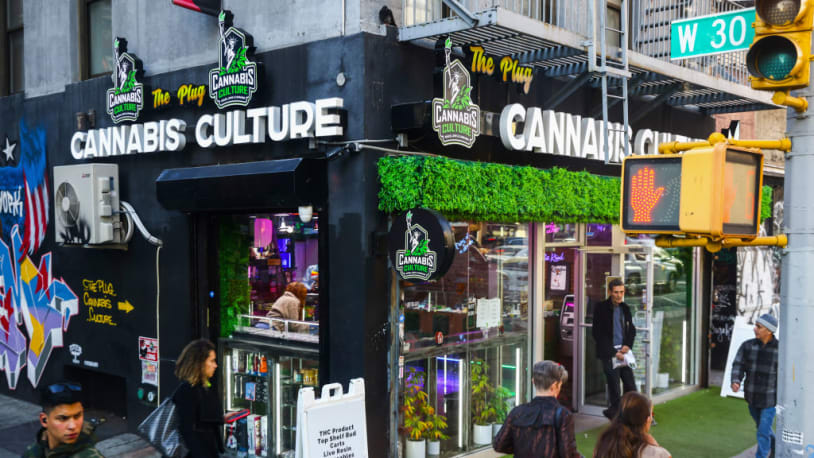
Are illegal weed retailers undermining the future of cannabis in NYC?
Last March, New York joined the ranks of states that legalized recreational marijuana use, opening the door for a legal cannabis retail market. While New York City officials made it clear that illegal cannabis sales would not be tolerated, a thriving underground cannabis market has emerged, illegally selling products to tourists, residents, and commuters, The New York Times reports.
State regulators and some industry insiders are worried that the growing number of unlicensed dispensaries, bodegas, and smoke shops are capitalizing on the legalization before regulators can set rules to build the legal retail market. They are pushing for these shops to be shut down, wary that they could undermine the legal market before it can officially launch. But supporters of the underground weed shops argue that they are providing employment and serving the needs of people left waiting for the slow rollout of the legal market, per the Times.
As the launch of the legal market grows nearer, the pressure to address illegal shops has become more urgent. The state’s Office of Cannabis Management approved the first wave of cannabis retail licenses, greenlighting three dozen entrepreneurs and nonprofits to open dispensaries to serve adults 21 and over. Officials say they hope to launch retail sales by the year’s end.
Critics of the proliferation of illegal cannabis sales cite several reasons they threaten the legal market’s future. Violence is a top concern. The unregulated shops often keep large amounts of cash and have been targeted for robberies, which have sometimes escalated to shootings and stabbings.
State regulators find smoke shops especially concerning because they give customers the impression that they are legitimate and lead to confusion about state regulations. In September, State Sen. Brad Hoylman (D) wrote Mayor Eric Adams a letter expressing concern after dozens of unregulated cannabis shops popped up in his district.
“These stores are deceptive to consumers, hazardous to public health, cheating on their taxes, undermining the State’s equity-based and legal cannabis rollout, and have little incentive to inspect IDs to ensure they are not selling to minors,” Hoylman warned in the letter.
Hoylman told Times reporters that the shops undermine lawmakers’ plans to prioritize people disproportionately affected by cannabis prohibition for opportunities in the legal cannabis market. They also circumvent the taxes intended to fund addiction services, education, and investments in communities impacted by the war on drugs, says the lawmaker.
Paula Collins, a lawyer representing smoke shops and bodega owners who sell cannabis, argues shutting down the shops would be a mistake. She says closing the shops would lead to widespread layoffs, and many employees are people of color. The move also unfairly penalizes the legacy marijuana sellers who helped normalize cannabis while they keep the state’s commercial real estate market afloat, she adds. Instead, she believes the city should be trying to legitimize the unlicensed sellers.
“We have all these shops popping up, everybody’s concerned, and at the same time, we’re missing out on all of this good tax revenue,” she said.
Last March, New York joined the ranks of states that legalized recreational marijuana use, opening the door for a legal cannabis retail market. While New York City officials made it clear that illegal cannabis sales would not be tolerated, a thriving underground cannabis market has emerged, illegally selling products to tourists, residents, and commuters, The New…
Last March, New York joined the ranks of states that legalized recreational marijuana use, opening the door for a legal cannabis retail market. While New York City officials made it clear that illegal cannabis sales would not be tolerated, a thriving underground cannabis market has emerged, illegally selling products to tourists, residents, and commuters, The New…